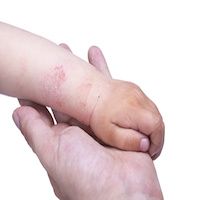Article
Biologics Can Benefit Kids with Generalized Pustular Psoriasis
Author(s):
Children suffering from generalized pustular psoriasis (GPP), who haven’t been responding favorably to traditional therapies, can potentially benefit from biologics treatment.

Children suffering from generalized pustular psoriasis (GPP), who haven’t been responding favorably to traditional therapies, can potentially benefit from biologics treatment.
While psoriasis is a commonly treated dermatologic disorder, certain skin patches have been known to cover the body with pus-filled blisters rather than plaques — affecting approximately 3% of patients. Because there is a lack of randomized controlled trials on the medical management of this condition, clinicians often turn to common, topical treatments to manage GPP.
Researchers at the University of central Florida College of Medicine said further clinical trials were needed to assess the safety and efficacy of using biologics in this “infrequently studied young patient group.”
In the interim, the research team compared the efficacy and safety of three available biologic agents: Enbrel (etanercept), Remicade (infliximab), and Humira (adalimumab). After reviewing PubMed literature of all reported cases of primarily pustular psoriasis, they identified 12 studies that fit their criteria.
According to the findings, the team indicated Enbrel could be a possible first-line biologic agent for pediatric psoriasis and GPP, followed by Remicade and Humira, respectively.
Experts explained that further research would allow patients who unsuccessfully tried traditional treatments to immediately attempt a regimen with biologic agents, rather than wait, but in the meantime, additional testing is required to demonstrate safety and identify possible adverse outcomes.





